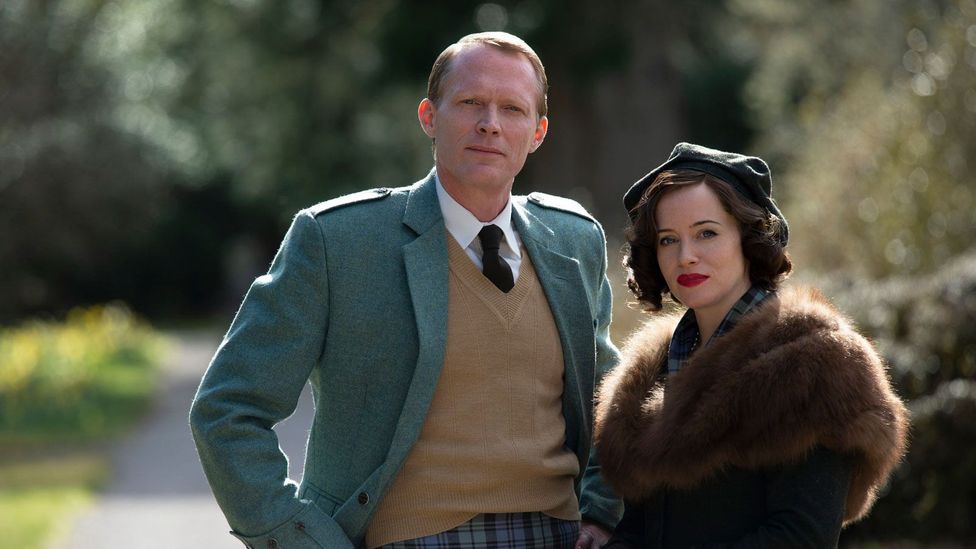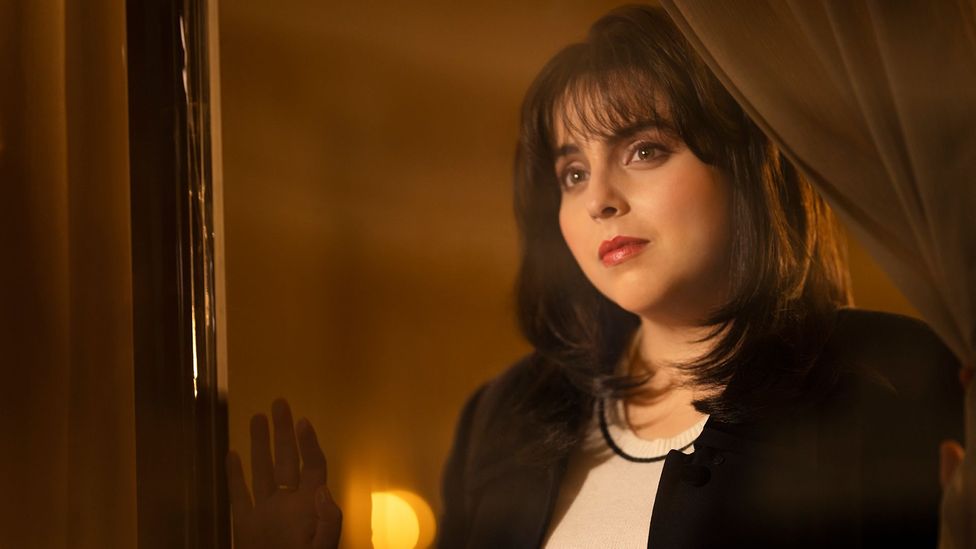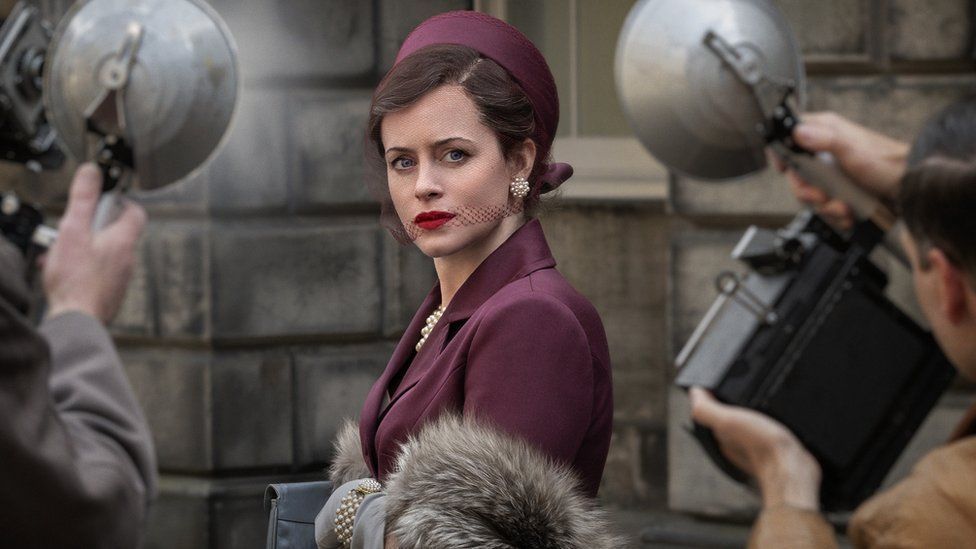Recent TV dramas challenge viewers to rethink the female victims of historic sex scandals. But are they able to change minds, writes Sophia Smith Galer.
I
In a scene from Hulu's recent limited TV series Pam & Tommy, a fictional publicist is perched on a pink armchair in front of Pamela Anderson, trying to string out a narrative to sell her next blockbuster. Pam (Lily James) has just delivered a monologue in praise of Jane Fonda, declaring how she wishes she didn't care what people thought of her, like Fonda, who balanced on a tightrope, "protesting Vietnam and selling workout tapes… being a feminist and a sex object." When the publicist asks Anderson if she's a people-pleaser, she smiles back delicately, and says, "that's all I do".
More like this:
- 13 TV shows to watch in April
- Anatomy of a Scandal is 'unintentionally hilarious'
- Pam & Tommy review: 'The sex-tape drama feels exploitative'
This world that the fictional Anderson wants – freedom from judgement – is not one that her character is ever afforded in the eight-part series. Nor, it seems, is the real Pamela Anderson, who wasn't remotely involved in the making of it. Telling the story of the home video of Anderson and her husband Tommy Lee that was leaked, and became a viral sex tape, Pam & Tommy calls itself: "a love story, crime caper and cautionary tale rolled into one". But who is this supposed to be a cautionary tale for – audiences who deny celebrities their privacy? Or women who dare to believe they might escape judgement?
Western literature and cinema have long told stories in which women fall into good girl/bad girl, virgin/whore dichotomies. The chaste win, and the fallen, well, fall – or are judged more harshly. Fantine, who had a child out of marriage, does not survive Les Misérables, but wholesome Mina Harker survives Dracula; Victorian artists such as those in the Pre-Raphaelite Brotherhood obsessed over painting fallen women, warning what the consequences of losing one's virtue would be. In the modern era, and especially post-MeToo, it's surely time to upend this tired narrative trope to show fuller characters, who are allowed to be flawed.
But what the world deems to be virtues and vices may have not changed as much as we'd like to think since the Victorian period. In my book Losing It, I document how widespread beliefs around virginity and chastity remain today. From sexually inexperienced women being more highly valued as partners in some cultures, to rape victims not being given justice in some countries if they fail a baseless virginity test, or indeed having their past sexual behaviour raised in trials, women's sexual histories continue to attract rather than escape judgement. Dare to transgress the moral expectations of the day, and you might find yourself being judged by nothing other than what you have done in bed and with whom.
TV dramas that revisit former sex scandals remain titillating; the audience's desire to devour every sordid detail remains. But three new iterations of this story have attempted to use that culture to persuade audiences to think a little differently. These dramas ask the viewer to consider how fairly sex scandals' victims have been treated – and what they show is that few saw them as victims in the first place.
Reshaping the narrative
Two of these series are based in a slightly more distant past, which undoubtedly affects the shaping of their narratives. The BBC's A Very British Scandal, released in the US on Amazon Prime this week, centres on the divorce of the Duke and Duchess of Argyll, who were married in 1951. The duchess was a well-known socialite with a vivid sex life; the duke had been married twice before. A tumultuous 12-year marriage ensued, and ended in a famous divorce case, which has been described as an early example of "slutshaming", notorious for the inclusion of a photograph of the duchess performing oral sex on someone who was not her husband. The drama airs nearly 30 years after the duchess died in penury in a nursing home. Then there is Impeachment: American Crime Story, which is decades away from the original affair between its protagonists Bill Clinton and Monica Lewinsky, and is clearly shaped by the fact that Lewinsky herself is a co-producer. In turn, these dramas ask the audience to follow the lives of the duchess and Lewinsky more closely, and with more sympathy than the press of the time ever afforded them.
Pam & Tommy sits slightly apart from these series; Pamela Anderson is neither long dead, nor has she been involved in the making of the show. She in fact declined to be involved, ignored Lily James' requests to make contact, and is now set to tell her story in her own way in a Netflix documentary, perhaps as a way to capture some ownership of the narrative. Despite several attempts in Pam & Tommy to cast Anderson as a victim of the male senselessness around her, it is ultimately a comedy, with breast prosthetics and even an animatronic penis, that does not pretend to be revolutionary. It's actually the controversy of the real Anderson's alleged discontent more than anything in the plot line that should give pause to consider: are women treated better in public life than they were before?

Hulu's recent limited series Pam & Tommy is one of several TV shows that attempt to reshape the narrative of celebrity sex scandals (Credit: Kelsey McNeal / Hulu)
What these dramas do show is that audiences are better at understanding that these women were victims; that one can have consensual sex but then have the boundaries and privacy of that sex so robustly redrawn that it renders you powerless. Each woman is reduced to intimate audiovisual media that they never consented to share with the wider world. They also happen to be the most salacious element of their stories: Anderson's sex tape, Linda Tripp's secret recordings of her conversations with Lewinsky, and the aforementioned photograph of Margaret Argyll. This is of course why these particular documents have been shared in the first place; because they're deemed to be of public interest, despite being amongst the most private information a person can possess. These women were not allowed to be 3D, rounded individuals with privacy rights – they were news stories and consumable sex content for the masses, defined by a moment in their lives that was used against them.
When, in Pam & Tommy, Anderson tries to express how violated she feels that people around the world are watching her at her most intimate, Tommy Lee responds, "It's not anything they haven't seen before," suggesting that Anderson's prior nudity on camera meant that this footage was somehow less invasive. The scene is filmed so that Anderson's horror is writ large on her face, and the viewer feels it too. Similarly, in A Very British Scandal, the Duchess of Argyll is seemingly entitled to nothing as she enters divorce proceedings, with her adultery levied against her in a way that feels disproportionate to her husband's cruelty, violence and avarice; similarly, her faceless lover goes unnamed and unscathed. The consequences don't ever seem to be borne by men. "How many men have you got?", the duke demands in one scene. She retorts: "How many women have you got?" It seems to be a question that the media at the time didn't seem to bother themselves too much about.

A Very British Scandal stars Paul Bettany and Claire Foy as the Duke and Duchess of Argyll, who were embroiled in a very public divorce (Credit: BBC)
These TV series uncomfortably reflect unjust ratios in the real world, and research into how unfairly women are treated helps explain what happened to our sex scandal protagonists, too. Women who attempt to seek justice for privacy violations around other image-based crimes, such as what is often called "revenge porn", have been found to experience victim-blaming that has long been observed in other areas of crime, like rape. In 2016, a Crown Prosecution Audit found that in 309 rape cases in England and Wales, 13% of cases had applications made asking the court to hear past sexual history evidence – despite a legal prohibition that condemns this – and 8% were successful. That is almost 1 in 10 cases in which a woman's irrelevant past sexual behaviour was used to try and discredit her. With "revenge porn", a term commonly used to describe image-based sexual abuse, research from Australia published in 2020 found that victims were perceived as more promiscuous and more blameworthy when they were more naked in the images that were shared.
With the real-life stories of these TV dramas, there is a bizarre inference of the women's complicity in sex scandals they very much did not want; Rand Gauthier, the man who stole Anderson's sex tape, thinks it's fair game because he can't distinguish her from the porn stars he watches obsessively, and in A Very British Scandal, the duke thinks it's fair game because he abhors his wife's behaviour. But these dramas also cleverly toe the line of not removing agency or flaws from its heroines – again, not fitting into the usual good girl/bad girl binary. The duke might be cruel, greedy and violent, but the duchess is no goody two shoes either, writing fake letters attempting to disinherit her stepchildren and performing the adultery she berates her husband for. She wants the photograph to be taken; she documents her extraordinary sex life with souvenirs taken from lovers' clothing, or by writing the coded letter "v" in her diary. The photograph was supposed to be part of that treasure trove, shut away privately in a drawer, and carries even more meaning as her marriage worsens, her husband grows more violent and her dreams of a happy future grow more futile. Anderson's home video is similar, a recorded memory of the actress and her husband after their wedding, preserved forever. Lewinsky may not have known she was being recorded, but she did believe she was sharing important, cherished information with a friend. And why not? Why shouldn't they partake in this recording and gathering of significant sexual memory?
Shaming and victim-blaming
For Impeachment: American Crime Story, the production team have said that Monica Lewinsky fought to have the scene included where she flashed Bill Clinton her thong. Her insistence that her participation in the affair was visible is important, possibly because that's not the point this series makes. It insists that trust of the deepest kind was broken – secrets shared between friends. The affair subjected Lewinsky to a life of public shaming of which she bore the weight, paralleling the inequal power dynamics that the series shows between her and the president.
Clinton may have emerged with marriage and presidency comparatively intact, but he doesn't escape Impeachment: American Crime Story unscathed. The depiction of Clinton's desire to control the narrative in his favour is constantly challenged by everything from the camerawork, shifting from handheld and shaky in his original, more predatory moments with Lewinsky, before turning steady and controlled as she gains more agency and distance from him, to the dialogue itself. In one episode, mid-season, he declares, "No one supports women more than me," but the irony is not lost on either the audience nor on his own wife. In a later episode, Hillary Clinton tells him: "You disorient people just long enough so you can get what you want." He and Linda Tripp are portrayed as villains, in contrast to the flawed yet inherently likeable Lewinsky (Beanie Feldstein). The viewer finishes this series rooting for her far more powerfully than you're left rooting for Anderson or the Duchess of Argyll. In their series, they are allowed some feminist revisionism, but Lewinsky is granted retribution.

Impeachment: American Crime Story stars Beanie Feldstein as Monica Lewinsky, in a retelling of the story of Lewinsky's affair with Bill Clinton (Credit: Kurt Iswarienko/FX)
That most recent era of the 90s/2000s celebrity sex tape now feels like a long time ago. Dwell on these series a little longer and you can't help but ask yourself: would we shame and victim-blame in the same way now? I'm not confident we are so much better than the news consumers of the past. The comedy of Pam & Tommy is reminiscent of the 2014 celebrity nude leak, when hundreds of private photos of mostly female celebrities were released, and it being nicknamed by Reddit and then repeated on mainstream media outlets as "The Fappening" (playing on a slang term for masturbation). That women's images and pasts can be used against them shouldn't be funny. And yet somehow, for many people, it was. And so, while Pam & Tommy is not wholly uncritical – it paints Tommy as selfish and unsympathetic to Pam's experiences, and turns the alleged power players of law, porn and early web media into caricatures – its cast of comic actors means the audience is expected to laugh as often as we're supposed to be horrified by people's profit-driven actions.
While these dramas might help us rewrite our own versions of historic events, it may have less bearing than we might hope for on our ongoing appetite for public shaming and sexism – especially when it comes to celebrity. Perhaps we are yet to truly comprehend what this also means in the age of social media, judging by what research around the world is starting to suggest.
An experiment from 2019 run by engineering students at Carnegie Mellon University, which looked at trolling in the Bollywood community, found that the more followers someone had, the less they trolled, and that many of the trolls the researchers interviewed thought they were being funny, not mean, possibly signifying an empathy gap between those with millions of followers and those with barely any. In an Avast Foundation survey in late 2021, more than half of British adults who thought online trolling was fair game believed that celebrities and TV stars sign up to be trolled, and 37% believed they "deserved it". Also in 2021, research from Glasgow Caledonian University found that people victim-blamed celebrities for abuse they got on Twitter.
Celebrities who are also women, vulnerable to victim-blaming over their sex lives, surely face a double bias. Perhaps, rather than making dramas that seem to right historic wrongs, we should be taking a harder look at the present.
Losing It: Sex Education for the 21st Century by Sophia Smith Galer is out now.
BBC Culture has been nominated for best writing in the 2022 Webby Awards. If you enjoy reading our stories, please take a moment to vote for us.
Love film and TV? Join BBC Culture Film and TV Club on Facebook, a community for cinephiles all over the world.
If you would like to comment on this story or anything else you have seen on BBC Culture, head over to our Facebook page or message us on Twitter.
And if you liked this story, sign up for the weekly bbc.com features newsletter, called The Essential List. A handpicked selection of stories from BBC Future, Culture, Worklife and Travel, delivered to your inbox every Friday.
